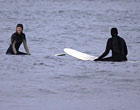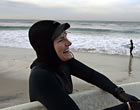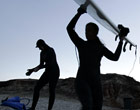Join now!

| Business HOME | HELP |
Join now!
|

|
| NEWS | ENTERTAINMENT | OTHER SECTIONS | CLASSIFIEDS | JOBS | CARS | HOMES | RENTALS | SHOPPING |
| January 8, 2006 | latimes.com : Business |
|
|
THE STATE
The Suits Are All Wet at These Board Meetings DEL MAR, Calif. — Rising before dawn, the head
of Pfizer Inc.'s research lab in San Diego fills her thermos with
coffee and follows the headlights of her Honda Element to the foot of
15th Street, where a beach parking lot is already filling up. Catherine Mackey, 50, trudges in her wetsuit across the sand beneath a murky gray sky, a new surfboard under her arm. A few other surfers are already in the water, hoping to ride the 4-foot breakers to shore — and to network with people like Mackey. "It's the new golf," said 48-year-old biotech entrepreneur Laura Shawver as she prepared to join Mackey in the chilly water. San Diego's biotech industry — surpassed only by research hubs in San Francisco and Boston — was born near the beach in La Jolla, where a critical mass of world-renowned research institutions are clustered — Salk Institute, Scripps Research Institute and Burnham Institute, along with UC San Diego. It makes sense that people in the industry would discover surfing in a place with a mild climate and miles of pristine beaches. But the sport also seems suited to an unpredictable business marked by stunning highs and crashing lows. The industry's passion for surfing is evident at sunrise, when high-powered biotech players equipped with the latest gear begin arriving at a stretch of shoreline known for its good surf. Between waves, they pick up the latest gossip in a local industry of more than 300 biomedical companies, which over the years have produced such breakthroughs as the PSA test for prostate cancer and the first antibody drug. The lawyers, financiers and scientists who attend the predawn gatherings have a name for them: board meetings. "It's where the best business gets done," said Paul Grayson, who invests in biotech ventures and just filled a business development position at one of his companies with an executive referred by a surfing pal. Each break along the coastline draws a slightly different crowd. Scientists from UC San Diego frequent a beach next to Scripps Pier. Biotechnology executives new to surfing favor a less challenging spot in Del Mar. It's often easier to track someone down in the predawn surf than to arrange a lunch meeting. And professionals don't charge for informal advice dispensed in the water. Networking wasn't what initially drove many biotech players into the surf. A desire to stay fit or work off stress motivated many professionals. Joel Martin, a venture capitalist, said the intense concentration required by surfing allows him to put day-to-day worries aside. "You can go back to the office with a clear head," he said. Shawver, a Iowa native who is chief executive of Phenomix Corp., a company working on drugs for immune disorders and metabolic diseases, said she took up surfing because it looked beautiful and exciting. She soon discovered its value as an icebreaker as she mingled with other biotech entrepreneurs around town. "It gives you something to talk about besides work," she said. "In business, it isn't really acceptable to say, 'Seen any good movies lately?' " Before long, Shawver was attending regular "board meetings" at the 15th Street beach, within view of the Del Mar racetrack. On one outing, surfing buddy Polly Murphy offered Shawver an early look at drug compounds developed by a scientist at Scripps, where Murphy negotiates licensing deals. Because surfing doesn't entail club memberships or reservations, any employee with a board can interact with the boss. Mackey of Pfizer, for example, regularly sends out e-mail inviting employees to meet her in the water. Brad Klos, director of sales and marketing for Innercool Therapies Inc., surfed with the company's chief executive two months before he was offered a job. Klos, who has an MBA from UC San Diego, wasn't hired because he was a surfer, but because an afternoon in the water allowed his future boss to get to know him better. "It raised my comfort level," said John Dobak, Innercool's chief executive. Brian Uzzi, a management professor at Northwestern University's Kellogg School of Management and a former surfer, said the sport tends to build relationships that are strong and lasting. Because the ocean is unpredictable, surfing can provide important character insights, he said. "You share the joys of the big day and commiserate over bad days," he said. "It is a lot more personal than going to lunch or dinner, or spending a night at the opera." One sign of surfing's popularity with the biotech crowd is the rising tide of businesses aimed at people with money to lavish on lessons and gear. Many offer surf clinics year-round and corporate team-building retreats. "They are baby surfers with gold cards," said Isabelle Tihanyi, founder of Surf Divas, a San Diego company focused on female surfers. "They want the best wetsuits, the best boards and gloves and booties and hoods." At Willis Bros., a company founded by professional surfers, revenue from selling equipment and giving lessons has soared in the last decade, a period that coincides with the rise of biotech in San Diego. Meanwhile, surfing has lost its beach-bum image and boards have become lighter, easing the entry of middle-aged professionals into the sport. "If you had told me five years ago I could make a living from surfing, I would not have believed you," said company co-founder Michael Willis. Surfing is woven into the culture of MoBioLabs Inc., a marketer of DNA test kits. A cracked surfboard is mounted on the wall behind Chief Executive Marc Brolaski's desk, a memento of one particularly wild ride. Each year, employees who don't surf are required to at least put their toes in the water at the company's Beach Day. Brolaski said surfing enhances his company's image — and the popular conception of scientists in general. "Not everyone who does science is a nerd, walking around with a pocket protector," he said. Instead, this new breed of surfer walks around with a BlackBerry, checking for alerts from an online service that provides forecasts of local surfing conditions. Cubicles at biotech companies empty when the surf is up, but that doesn't necessarily slow the pace of commerce. Expecting good surf one afternoon last month, Grayson, a financier with Sanderling Ventures, ferried four other deal makers to an offshore reef break aboard his 45-foot yacht. The group, three financiers and two business executives, talked shop during the 30-minute cruise to the location and then surfed for hours until sunset. When Rincon Inc. wanted to learn more about drug development several weeks ago, company founder Steve Mayfield asked a scientist to meet him at Pillbox, a surfing spot in Solana Beach. Mayfield — who named his company after a famous surfing beach between Ventura and Santa Barbara — said he picked up pointers about animal tests and government regulation from the scientist between waves. Back on shore, Shawver and then Mackey made their way to the parking lot after an hour of battling rough surf. Shawver had managed to catch two waves, but Mackey struggled. "This is just like science," Shawver said. "You must be very persistent. You can have spectacular wipeouts followed by the high of your life. And you are always looking for the next one."
If you want other stories on this topic, search the Archives at latimes.com/archives. Article licensing and reprint options |
Photos

(Allen J. Schaben / Los Angeles Times)

(Allen J. Schaben / Los Angeles Times)

(Allen J. Schaben / Los Angeles Times)
|